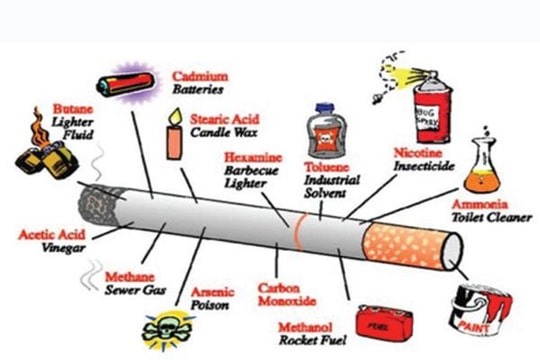Long-term hearing damage from smoking
Smoking affects blood flow to the ears, causing lack of oxygen and failure to remove toxins, causing long-term hearing damage.
The study, by the University of Antwerp in Belgium, involved 4,000 men and women aged 53 to 67. They were tested for hearing, lifestyle and workplace issues.
Research has shown that people with hearing loss have a better ability to perceive high-frequency sounds.smokeand obesity are significantly damaged: "Hearing loss is directly proportional to the level of smoking and body mass index. It will get worse if you smoke continuously for more than 1 year. In addition, unlike other parts of the body, hearing, once damaged, cannot be restored."

Smoking and obesity disrupt blood flow to the ears, causing a lack of oxygen, and also fail to remove toxic waste from the ears, thus damaging hearing, researchers say.
The anti-smoking group Action for Health said this should serve as a warning to young smokers: "Many young people think they will quit smoking when they get older and escape the associated diseases. But in some cases, the effects of smoking have already taken place and cannot be reversed."
Another study also found that passive smoking and secondhand smoke exposure caused mild sensorineural hearing loss in children aged 5-11 years. Sensorineural hearing loss involves damage to the lining of hair cells in the cochlea or damage to the auditory nerve. Unlike hearing loss related to the outer or middle ear, sensorineural hearing loss is severe and currently untreatable.
Countless dangerous chemicals in smokecigarette, including formaldehyde, benzene, arsenic, vinyl chloride, ammonia, and hydrogen cyanide, can affect both conductive hearing (middle ear vibrations) and inner ear hearing by damaging the arrangements of hair cells in the cochlea. Hearing loss related to smoking depends on the number of cigarettes smoked.
Quitting smoking reduces the risk of hearing loss and prevents cancer and other vascular diseases. It may be difficult to quit smoking at first, so you should consult your doctor to come up with an effective plan to quit smoking and limit the use of tobacco again.
According to the American Lung Association, within 20 minutes of your last cigarette, your blood pressure drops and your circulation returns. Within eight hours, your carbon monoxide and oxygen levels may return to normal. Within 48 hours, your sense of smell and taste improves, and your nerves begin to regenerate.








